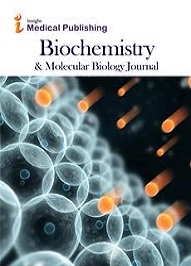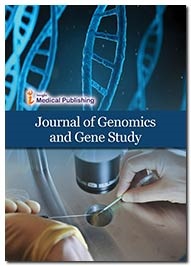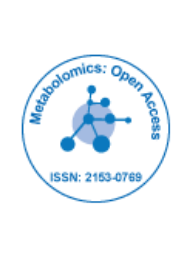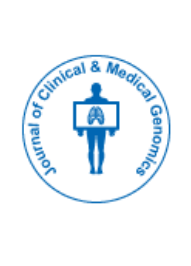Conference Series LLC LTD proudly invites participants from all over the world to attend the Webinar "2nd International Conference on Metabolomics, Genomics and Proteomics” scheduled to be held during September 28-29, 2020. The theme of the conference is “New Strategies & Emerging Trends in Metabolomics, Genomics and Proteomics research” which will ignite young minds and researchers in searching for a novel approach towards the marvels of a sustainable future.
Metabolomics congress 2020 Webinar goals to unite a great number of participants through online platform which include Professors, PhD Scholars, Students, Metabolomics & Proteomics researchers, Biochemist, Genetics Associations, Pharmaceutical Industrial Giants, Genomic Expert Bioinformatics Professionals and Business delegates from all over the world with the related topics to deliver a speech and share the current research ideas and strategies.
The Webinar deals with the importance of Biochemistry and includes a detailed understanding of Metabolomics, Genomics, Proteomics, Clinical Metabolomics, plant and environmental metabolomics, Metabolomics Approaches, next-generation sequencing, Pharmacogenomics, Cancer genomics, Mass Spectrometry in Proteome Research, Proteomics from Discovery to Function, Protein Expression and Analysis, and Many more.
Metabolomics Congress 2020 Webinar encounter the target market with members from across the globe, committed to learn about Proteomics and Bioinformatics which provides an opportunity to interact with eminent Scientists, researchers, Business Leaders, experts from all over the world on online. Conduct presentations, distribute and update knowledge about Metabolomics, Proteomics and Genomics are the principal features of this conference.
Target Audience
-
Scientists and Researchers organizers
-
Directors of Biochemistry department
-
Hospitals and Healthcare professionals
-
Metabolomics Research and Development (R&D) Companies
-
Metabolomics Instrumentation Technology Product Manufacturers
-
Metabolomics Industry Consulting Firms
-
Genomics Researchers
-
Proteomics and Genomics Scientists
-
Pharmaceutical companies
-
Genetics Associations and Societies
-
Cardiologists
-
Doctors
-
Academic researchers
-
Professors
-
Business delegates
-
Young Researchers
-
Advertising and Promotion Agency Executives
-
Medical & Pharmaceutical Companies
-
Biomedical Research organizations, societies and associations
-
Software developing companies
-
Data Management Companies
Track 1: Cancer Metabolomics Approaches
Cancer biomarkers have many potential applications in cancer diagnosis, including screening, diagnosis, risk assessment, prediction of response to treatment, and monitoring of progression of the disease. Metabolomics is growing in the field with particular attention to its application as a biomarker in cancer diagnosis. Biomarkers of disease could incorporate a wide scope of biochemical elements, for example, different types of enzymes, lipids, proteins, sugars, and little metabolites, nucleic acid, cytokinetic and cytogenetic parameters etc.
Track 2: Metabolomics in various Diseases
Metabolomics is the newest omics platform that offers great potential for the diagnosis and prognosis of neurodegenerative diseases as an individual’s metabolome reflects alterations in transcript, genetic, and protein profiles and influences from the environment. Small numbers of metabolites have been used to diagnose complex metabolic diseases as well as monogenic disorders such as inborn errors of metabolism. Metabolic Alterations in Cardiopulmonary Vascular Dysfunction are the leading cause of death worldwide which affecting the functionality of the heart and blood vessels.
Track 3: Plant and Environmental Metabolomics
Metabolomics is the study of exogenous and endogenous low atomic mass metabolites inside of a cell, tissue, or bio fluid of a life form. The sub-control of environmental metabolomics is the utilization of metabolomics strategies to investigate the connections of life forms with their surroundings. Plant Metabolomics deals with the evaluation of plant framework at the sub-atomic level giving a non-one-sided characterization of the total metabolite pool (metabolome) of plants under particular conditions whereas environmental metabolomics is the utilization of strategies to find out the relationship between life forms with their surroundings.
Track 4: Clinical Metabolomics
Clinical metabolomics is gaining appreciation as an essential tool in precision medicine. Significant progress in separation science, mass spectrometry, and nuclear magnetic resonance spectroscopy occurring within the past few years are responsible for strengthening the analytical basis for metabolite identification and measurements in clinical samples. Metabolomics-based strategies in modern clinical studies are allowing a better understanding of pathophysiological conditions and disease mechanisms, as well as providing innovative tools for novel diagnostic and prognostic approaches. Decades of research have strongly suggested that metabolism is not a self-regulating network operating independently.
Track 5: Food and Nutritional Metabolomics
Nutritional metabolomics is using chemical profiling of small molecules to support the assimilation of nutrition and diet in complex bio systems research. Nutrigenomics is a branch of nutritional genomics which deals with the effects of foods and food constituents on gene expression. Foodomics derived from the digestion and biotransformation of foods and their constituents in which MS techniques are considered indispensable.
Track 6: Genomics
Genomics uses a combination of recombinant DNA, DNA sequencing methods, and bioinformatics, to assemble, and analyse the structure and function of genomes. Thus, proteins make up body structures, for example, organs and tissues and additionally control concoction responses and convey motions between cells. Genomics likewise includes the sequencing and examination of genomes through employments of high throughput DNA sequencing and bioinformatics to collect and break down the capacity and structure of whole genomes.
Track 7: Cancer genomics
Cancer genomics is the study of the entirety of DNA sequence and gene expression differences between tumour cells and normal host cells. It aims to understand the genetic basis of tumour cell proliferation and the evolution of the cancer genome under mutation and selection by the immune system, the body environment and therapeutic interventions.
Track 8: Clinical genomics
Clinical genomics is the use of genome sequencing to advise quiet analysis and care and it is a rapidly growing field. Genome sequencing is depended upon to have the best in portraying and diagnosing extraordinary and obtained contaminations, stratifying individuals' tumors to manage treatment (precision sedate), giving information around an individual's threat of making illness or their comprehensible response to treatment.
Tack 9: Protein Expression and Analysis
Protein expression refers to the way in which proteins are synthesized, modified or changed and regulated in living beings or organisms. Recombinant protein expression refers to the construct of proteins which derived from recombinant DNA. In protein research, protein expression can apply to either the object of study or the laboratory techniques required to manufacture proteins. Protein analysis is the bioinformatics study of protein structure, it’s interaction and function using database searches, sequence comparisons, structural and functional predictions.
Market Analysis:
Metabolomics is an emerging field which combines strategies to identify and quantify cellular metabolites using sophisticated analytical technologies with the application of statistical and multi-variant methods for information extraction and data interpretation. Metabolomics is the study of small metabolites. Metabolomics Conference deals with topics like Bioinformatics, Proteomics, Genomics, Analytical Techniques like NMR, GC-MS, LC-MS and CE-MS, Lipidomics, Metabolic Modelling, Metabolic Profiling, clinical metabolomics, Translational Sciences, Mass Spectrometry, Metabolomics Syndrome, HPLC and CE based metabolomics and more. Metabolomics - the new "omics" - is a dynamic and developing field, joining genomics, transcriptomics and proteomics in empowering an integrative frameworks science methodology to drug discovery and development. In spite of the fact that metabolomics is still at an early evolutionary stage it is conjecture that throughout the following decade the biopharma business will apply this innovation all the more generally in drug development and information.
'The Future of Metabolomics' gives fully fledged understanding into the compelling utilization of metabolomics all through drug discovery, preclinical development and clinical trials. The report also highlights the use of metabolomics in maximizing and sustaining revenues post-marketing and in the development of clinical diagnostics.
Importance & Scope:
Metabolomics is now being extensively used in pharmaceutical and biotechnology industries for biomarker and drug discovery; pharmaceutical and biotechnology industries are expected to grow at a high rate in coming years, which is expected to boost the growth of the market.
The National Institutes of Health said that they are to invest $14.3 million for metabolomics research, potentially investing more than $51.4 million over five years, to accelerate an emerging field of biomedical research known as metabolomics. As per National Centre for Biotechnology Information. Metabolomics has matured over the past 10 years. Over 300 studies have been completed over the past 5 years.
Why Singapore?
Singapore is the second largest Life science market in the world after USA, Occupying about 10% of Market in each of the global drug and Medical devices market. According to Data monitor, the Singapore biotechnology market had total revenue of $ 43.3 Billion in 2013. By 2019, the market is expected to grow to $ 53.8 Billion.
The Singapore pharmaceutical market is the world’s second-largest, with 2013 sales estimated at $115 billion. Singapore accounts for a little less than 10% of the global Pharma market, compared with 38.4% for the U.S. and 20.7% for Western Europe. The Singapore market is a promising region for metabolomics companies, as a high amount of metabolomics research is being conducted in the country.





